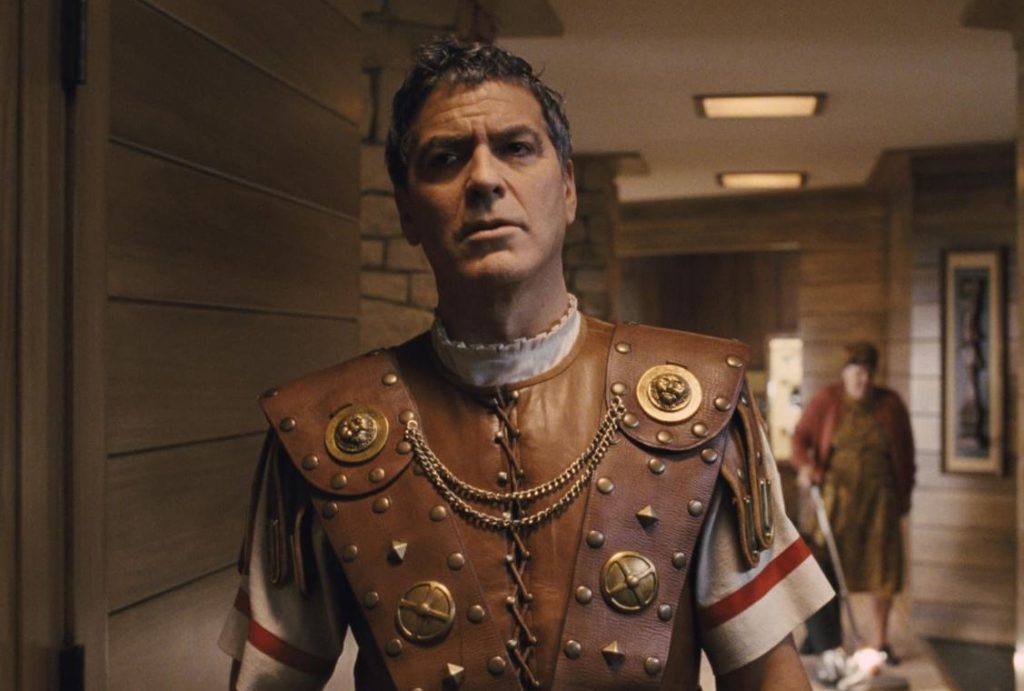
1. Messiah
That’s the key to Hail Caesar! one word, from the Hebrew ‘Mashiah’–’he who is anointed’, anointed for what? Nobody agrees. The Greeks had a word for this anointed person, this person anointed for a task yet to be agreed upon but which will be paradigm shifting all the same: ‘Christ.’
Everybody is a Christian in the etymological sense, they all anticipate an anointed one i.e. a human agent sent by God for a purpose still up for debate. Jews anticipate a political figure which will make all men brothers, Christians figure he’s been here already, but will come again, after a sustained Earth-wide dystopian clusterfuck, and ‘judge the nations’, the end result being the universal brotherhood of anyone who manages to, you know… ahem… survive the aforementioned global undoing.
The Muslims have the Mahdi—didn’t know about him, didja—well, that’s they’re golden boy, right now, according to the Koran, he’s at the bottom of a well (?) but will return, on a white horse, eyes flashing like stars TO FUCK YOU UP! That’s right, the Muslim messiah ain’t no Prince of Peace ( Bah! Phooey!) he’s the Prince of Foots Up Your Collective Asses, there’s no concept of forgiveness in Islam and their messiah ain’t sellin’ any, so (drop me a beat!) it’s gonna be chip-chop-all day on the block-unbelievers beg mercy, but Allah does the cursin’ and if you ain’t a Muslim yo’ head gonna drop- All on your knees, sayin’ Allah please-please—it’s all a waste of time ‘cuz the Mahdi won’t stah-hop-–
…but I digress.
What’s at issue in Hail Caesar! is the nature of the Christ–not the Mahdi, thank goodness, his nature isn’t up for debate—but who is right otherwise: The Christians, whose messiah is kindly soft-spoken friend of the lost. The Jews, whose Messiah accomplishes his duty through politics, even rough politics, or some third vision, perhaps a shepherd-figure, not so much a saint but saint-adjacent.
The Coens are Jews, they tackled the Old Testament by aggregating it into the life of one college professor in A Serious Man. Their next effort was no less ambitious, the New Testament, or, being Jews, unwilling to grant total prominence to Christianity, The Less-Than-Murderous Messianic Faiths: which comprises Christianity, Talmudic Judaism, and Secular Judaism, because even secular Jews, the movie states, fashion Christs for themselves in a mad need to, well…have something to believe in.
All Christs must have a mission, their ‘prize’, that justifies their arrival on Earth. Christians and Jews agree on this point, the prize of the messiah is the Gentile. The Non-Jew Swine Eater besotted in sin and ignorant of the divine, having no concept that he was born sick and must, through one process or another, be made well (prescriptions differ wildly).
Christians and Jews agree also in another concept, the concept of false Christs. What do all Messianic Characters have in common: 1) They are male 2) They perform Miracles 3) They establish a regime of peace 4) they are both outwardly and inwardly pious 5) they enjoy universal adoration—however, false Christs will fail in one or more of these factors, no matter their following or the loyalty of their fanbase.
But by what means is the true Christ secured in his legacy. By war? Politics, perhaps, but what kind? contentious, bitter, nasty politics? Through miracles themselves, the inspiration of faith? Recall that the goal of the Christ is God, not himself. That he is merely a facilitator of Earth-bound institution’s alignment with Heavenly institutions.
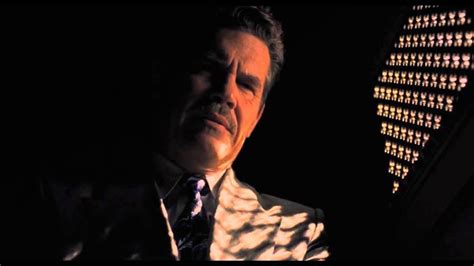
Forgive me father, for I have sinned. When I was a teenager living in Oregon, I didn’t let my little brother go looking for a secret pirate treasure—even though we needed the money. I was always trying to get him to go back, I was just an all-around heel. Even when three criminals were hot on our tail, I didn’t let up. He still won’t talk to me.
2. Eddie Mannix
And so, in Hail Caesar! we are presented with a man. Eddie Mannix. Having roused a tired priest out of bed so he could give confession before his day as a Hollywood studio fixer begins. He is seriously concerned about lying to his wife about quitting smoking, but also a great decision is in the works, he’s being courted by Lockheed-Martin to run their operation, a real job, for real, real money in the realest industry post-war America could provide: War. A far cry from baby-sitting, a lot of vain flibbertigibbets with questionable sexual appetites and even more questionable political leanings.
But though his road is diverging in this yellow wood, he still has a job, and work is what Eddie Mannix is all about.
He sits in his car, smoking, tilting his watch, keeping one eye on a little house, in a little neighborhood off Sunset, where, through the curtains of the front bay window we see explosions of sudden light—flashbulbs, and with them the sound of girlish giggling.
The narrator gongs: “5 AM, still shank of night for some but for Eddie Mannix the beginning of a new work day…but the work of Eddie Mannix cares not for day or night, and cares little for his rest.” here, Eddie leaves his car, strolls up to the house and without knocking, enters. “Churn that butter, baby.” Inside, a pretty young woman dressed as a busty milkmaid is pumping a butter churn most suggestively, and some creep is taking pictures. When he sees Eddie, he’s scared. Eddie demands the negatives, the creep runs when he hears sirens outside, Eddie guts the camera, letting a cascade of celluloid spill to the ground. “Jesus Christ on a scooter, Eddie. We were just taking a few pictures.” to which Eddie grabs the young woman, and, grit-jawed, slaps the sweet cream right out of her… When the police come in, they aren’t shocked to see Eddie there, they said there were complaints of a possible ‘french postcard situation’. Eddie laughs it off, slips a fifty to each cop and Eddie bums a cigarette.
I describe that opening scene in full because it is some of the best, most compact characterization of anybody in any film—a true magnum exemplum, in the space of three minutes we learn Eddie Mannix is honest, forthright, diligent, pro-active, brave and stern, he is also well-liked, judging by the cops, having a working man’s retinue of casual working man’s relationships, but not so well-liked that he isn’t feared as we can see in the creep’s cigarette-sputtering retreat, he seems approachable as the starlet is comfortable complaining about his invasion, but also solidly in command as he thinks nothing of giving the dirty girl some chin music to put across the seriousness of what she’s done. But he’s flawed, even though an hour before he was nearly brought to tears about his inability to quit the sticks and lying about it, he makes sure to puff a Pall Mall the second he sees his cop buddy puff his. In 180 seconds a fully-rounded character appears, if it can be done faster or better, I haven’t seen it.
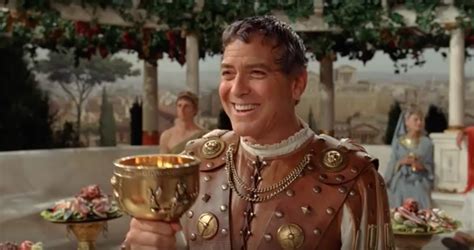
I mean, what was I thinkin’ right? “That man will never be president.” I just said it. Just like that. No thought whatsoever. Never mix Cocaine with Ambien, I once tried to convince my wife that ‘Delaware’ was a Fox News conspiracy.
3. Baird Whitlock
Now we are presented with another man, Baird Whitlock. Actor nee ‘movie star’ appears on screen as Eddie Mannix watches the dailies for a film called Hail, Ceasar! A Tale of the Christ. In the footage Baird (George Clooney) rides into the foreground on a chariot dressed as a Roman soldier, in the plot of the film-within-a-film, this Roman is returning to Rome after a lengthy campaign and is positively giddy with the thought of a hot bath.
But then we’re taken to the set of the next scene, a party at a Roman villa. The room is filled with extras adorned in togas and tunics, but there are two in particular, a gaunt, bald one and—is that Neuman from Seinfeld?! Indeed, it is, Wayne Knight plays the second shifty extra who pours a fizzy drug in the wine goblet of Baird Whitlock just before the scene begins, there’s actual liquid in the goblet and the two agent provocateurs watch with suspense as Baird almost drinks-doesn’t drink-almost drinks-doesn’t drink but then drinks and they sigh with relief. Baird, still in his Roman soldier costume, stumbles back to his trailer, passes out in the arms of the two extras and then is kidnapped in broad daylight, off the lot and far away—when he’s reported AWOL from the set, Eddie thinks he’s on a bender.
Because this famous man in the Roman armor is a drunk, inclined to wake up in strange places after a blackout. More than that he’s a womanizer, when they called his wife there was no hiding it, “He’s not home, he’s never home. Call one of his chippies.” Baird is a normal man, and in the theological sense ‘normal’ means Screwed Up Like a Chandelier. But he’s the prize.
Of whom, you may ask: why, the Communists of course, Jewish Communists—more on them later.
4. The Coens Begin to scare me.
I have a serious technical grumble at this point in the story. Still watching the dailies, the film-within-a-film states that a man from the east, Saul, is about to have a peculiar vision, describing him as a simple tradesman from Tarsus. This is where I started, just a little, t lose faith in the Coens grasp of Christianity and the New Testament, because Paul was a pharisee—yes, also a tent-maker– but a religious zealot whose job it was to find Christian cells expose them and execute them.
He wasn’t in Bethlehem, he was on his way to Syria, plus the Road to Damascus event was no vision, rather a bright light bucked him off his horse and Jesus spoke to him, “Paul, why do you persecute me.” His name changed in an instant and he had thick, crusty scales over his eyes for three days until his vision returned, oddly he was taken to the house of a Christian who recognized him and just about shat his tefillin.
Also, Paul never met Jesus and was barely a contemporary, his ministry was after the ascension, even though later they show the setting of the film-within-a-film to be smack dab during Jesus’ life. Okay. Minor point. But I’m watching you two, if you are going to pontificate on the New as you did the Old, I want to see meticulousness—not for me, for the sake of your artistic cred, which has never failed, and this didn’t fail it either, but now I’m watching.
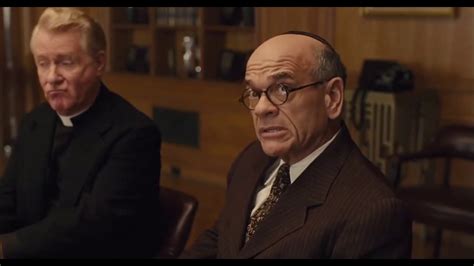
“If you ask me, the messiah is anybody who can stop this guy from rubbing my leg under the table.”
5. A Gaggle of God’s Men
The Coens must have felt the eye of Sauron on their back because a few scenes later Eddie’s having a confab with a priest, a pastor, a Greek Orthodox patriarch and a rabbi (for some reason), to the rabbi’s credit he admits that when it comes to the depiction of Jesus the Jews don’t have much of an opinion, so, he didn’t get why he was there either.
But I do.
He was there so the Coen’s could have Jewish mouth to talk through in what was one of the highlights of the movie. The theological argument.
It starts with Eddie selling this movie to the men of cloth, probably because wants to see if he has protests ahead of him. He assures them that Jesus will be played by a kid named Todd Horkheiser, an unknown, but only seen for a few seconds. Since the men were sent the script, Eddie wants to know if their depiction is respectful, which sets everybody tossing a transcendent word salad trying to explain the nature of Christ.
“But the religious aspect, does the depiction of Christ Jesus cut the mustard?” asks Mannix.
“The nature of Christ is not as simple as your photoplay would have us believe,” the priest says. “It’s not as simple as God is Christ and Christ, God.”
“You can say that again, the Nazarene was not God,” pipes the rabbi.
“He was not-not God.” said the patriarch
“Part God,” says the Rev.
“No sir,” said the Rabbi
Mannix settled the table down “Rabbi, all of us have a little bit of God in us, don’t we?”
“It is the foundation of our belief,” says the priest “that Jesus is best referred to as the Son of God….so the rest of God’s children, we imperfect beings, may enter Heaven, through faith.”
“So, God is split?”
“Yes,” nodded the priest, “…and ‘no’.”
“There is unity in division, “the patriarch says, leading the the Rev to offer,
“And Division in unity.”
“I don’t follow,” shrugs Mannix.
“Young man, you’re right not to follow, these men are screwballs. God has children, and what? A dog? A collie maybe?–He’s a bachelor, and very angry.”
“No-no, he used to be angry,” says the priest.
“What? He got over it?”
Rev: “You worship the God of another age.”
Priest: “Who has no love.”
Rabbi: “Not true, he loves Jews.”
The reverend takes exception, “God loves everyone!” to Which the Priest replies,
“God is love.”
“God is who is.” said the patriarch, which infuriates the rabbi,
“This is special? Who isn’t who is?”
“But how should God be depicted in the motion picture?” asks the priest.
Rabbi: “God isn’t in the motion picture!”
Then reverend frowns, “Then who’s Todd Horkheiser?”
This goes on for some seconds until Eddie’s had enough, he wants to know if their depiction of Jesus was fair, to which the patriarch answers “I’ve seen worse.”
And I agree, I’ve seen worse too. There’s an interesting detail I know the Coen’s wanted to get over. When the director of Hail, Caesar! panics because Baird is missing, he’s describing why they can’t wait, his big scene is coming up–they casted the most Jewish actor to play the director, Robert Trebor, to say these words, “The character’s speech at the foot of the penitent thief shows that he has absorbed the message of the Christ, we need his star power. It’s the heart of the picture.” By using who has to be the most Jewey of actors—I mean, there ain’t no way you get this wrong– what the Coens seem to be telling us is “You remember all those Jesus movies from the fifties? [probably laughing] We did those! You thought it was somebody else? See, we understand, we get it, we get it well enough to make what you guys call landmark Christian cinema.” You can feel their enjoyment revealing that to us, gratefully, it didn’t come off as vindictive, more like a fraternal jab.
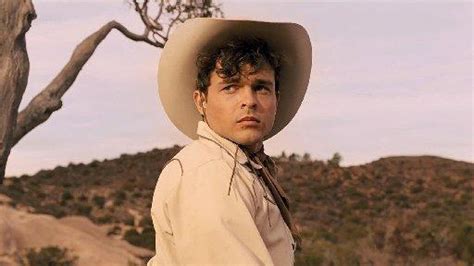
Jee-zuss- Jeesus-Jeezus/ The only thing he needs is/ A table by the window at Zabar’s/ Don’t bribe the maitre-d/ He’s a stone cold S. O. B/ I hear he did time for keying cars.
6. Hobie Doyle
Then they present to us, a man—Hobie Doyle. Hobie is a singing cowboy and rodeo star, the lead in westerns where gun, rope and horse tricks are the gimmick. We see him first on set, where he’s chasing a guy on horseback then, coming against a low-slung branch, miraculously wraps his legs around it and spins a hard 720, head over tail, coming to a seated stop, shooting the bad guy off his horse and dropping into the bad guy’s saddle before whistling for his own horse. Cut. The director said that four perfect takes was enough. He is then summoned back to the studio as he eats a plate of beans.
In contrast to everyone else Hobie is sober, kind, generous, modest and unpretentious, not to mention chaste, an aw-shucks rural man thrust into a cynical, selfish Gomorrah and when Mr. Skenk, the studio chief in New York, suggested they use Hobie in a top-hat-and-tails parlor drama called Merrily We Dance, not only is Eddie Mannix dubious, but the director, Lawrence Laurentz (Ralph Fiennes), is apoplectic. “This is an adaptation of a Broadway smash, it needs a real thespian not a ro-day-o clown.” Hobie’s first day on the set was awkward to say the least, he doesn’t know what ‘mirthless’, ‘rueful’ or ‘trippingly’ means so saying the elementary line “Would that it twere so simple.’ becomes a Herculean labor, still, seeing him walk bowlegged in a tux has to be one of the better sight-gags.
Yet, Hobie is the one-man Eddie confides in when he’s stuffing 100,000 dollars into a valise as ransom for Baird, and he’s the only one equipped to give the stressed Eddie Mannix any helpful advice, albeit filtered through a Stetson hat, “This is bad. Bad for movie stars everywhere. You don’t know who’s mixed up in this?” He asks Eddie, who shakes his head, “then I’d look at the extrees.”
“The extras? Why?”
“Well, you just don’t know with an extree, they come and they go—I’m not making a blanket call here, there’s good extrees and bad extrees, but you look at an extree and you just don’t know what he’s thinking.”
The ransom note said to leave 100,000 dollars behind the electrical box on one of the sound stages, when Eddie goes to place it there a musical is being filmed, so let me introduce you to one of the great set pieces of this movie:
THE GAYEST DANCE NUMBER IN HISTORY
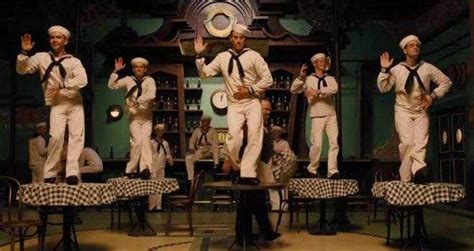
Production still from “The Horrified Face of Admiral Nimitz” based on the play “What Happens Behind the Bulkheads” by Tennessee Williams.
7. Burt Gurney
And here we are presented with a man, Burt Gurney. We don’t know this till later, but Burt (Channing Tatum) is a Communist, and a high-ranking one, he arranged the abduction of Baird and is the head of the cell that did the deed, but right now he’s a singer and dancer on this final day of shooting on a bar-set called The Swinging Dhingy, and he’s a great dancer, the number he performs is worthy of a major star, and Burt Gurney is a major star, major enough to carry a whole film…it’s pretty good tap-and-scratch, mid-50s choreography, too. If it wasn’t such a profound joke, it could have stood on its own: twenty sailors about to leave port for eight months, at last call, as they bemoan the loss of women. Hilariously, the song is a stack of double entendres about what the sailors might have to resort to, out there, on the dame-less waves.
“Eight months without a dame,” Burt Gurny, the lead, says. “Can you beat it?”
“You’re gonna have to beat it,” says the bartender, cleaning up, trying to get the sailors to leave.
Burt Gurney sings:
We are heading out to sea/ and however it’ll be/ it ain’t gonna be the same/
Cuz no matter what we see/ when we’re out there on the sea/ we ain’t gonna see a dame
We’ll be searching high and low/ on the deck and down below/ but it’s a cryin’ shame
We’ll see a lot of fish but we’ll never clock a dish/ We ain’t gonna see a dame
We’ll see some octopusses/ No Dames!
Or a half-a-dozen clams/ No Dames!
We may even see a moy-maid
All: But moymaid’s got no gams!
Bass: Nooo Gaaams!
–Some serious tap dancing ensues on the floor, then they tap on the tables in a kind of acrobatic stunt wherein the bartender rips the tablecloths out from under their feet. Burt Gurney then miraculously performs an impossible leap across the room and the tapping continues until one sailor says, “Do we have a girl for you!” and throws himself into Burt gurney’s arms to dance, then they pair up and all dance with each other: CUE GAYNESS
Out there on the sea/ Here’s how it will be/ I’m gonna dance with you, pal/
You’re gonna dance with me!/
When we’re out there on the sea/ We’ll be be happy as can be
Or so the Captain claims/ But we’ll have to disagree/ Cuz the only guarantee
Is I’ll see a lot of you/ And you’ll see a lot of me!
ALL: And it’s absolutely certain that we’ll see a lot of ‘C’
Cuz there ain’t. Gonna… Be… No dames.
Burt Gurney gets caught between two dancing sailors leading to a rhythmic dry hump, after which Gurney pairs off again, flipping one sailor over…
No Dames!
..and the scene cuts with Burt Gurney’s face in his fellow sailor’s upturned crotch.
Not the subtlest of subtexts, but funny as fuck.

Friggin’ bird—shoo! Git! I’m trying to write! If you’re the Holy Spirit then why do you keep crapping on my hat? Go!
8. The Communists
[drum roll, a spotlight shines on a man in a red-and-white striped jacket, with a bowtie, standing at a podium in front of a studio audience.]
Announcer: It’s time to play Who da Messiah? With your host Thomas Acquinas.
Host: Thank you so much, Gary, and that’s right, we’re here to play the most popular and long-running game in the world. Who da Messiah? I’m Thomas Acquinas, 13th Century Benedictine priest and philosopher, known, most notably, for reconciling faith with reason and my dissertations on Natural Law. But I’m here to ask that most important question, just Who dis Messiah anyhow?!—
–APPLAUSE–(meek laughter)
Host: (laughing with his bleach-white teeth) uh-Ha-HA, yessiree. Three men, all messianic figures—some, you know, dreamed up by Jews, who, let’s face it—got some esplainin’ to do.
–APPLAUSE–LAUGHTER–
Host: I kid the Jews, I kid—but the situation is a head-scratcher. Who’s the messiah? The pragmatist, the pietist, or the politician—it certainly isn’t the ‘prize’, that clam-eatin’ star-worshipper can’t make heads or tails of his trainwreck existence, but it seems the Jews are no more prepared to explain anything with their ‘dialectic of history’ or their areligious religion. As a 13th century Benedictine theologian and tastemaker, I am firmly in the Christian Camp of the Messiah being a spiritual exemplar, some Jews might agree, but Jews of an earlier era who also fancied him a kind of super-wise shepherd, having a direct line to God and a firm hand suppressing the unholy chaos of Man.
Later on, they’d get this funny political notion that I can’t help but feel indirectly responsible for, being an Italian. Seems the Jews began believing in a political messiah because of all the havoc rained down on them from governments, they wanted a figure of war that was also a stalwart beacon of equality that would create the ‘New Man’.–So come on back, won’t you, as we parse the details and mark-down from retails, three Christs and maybe, finally, perhaps figure out– what?! [audience screams] Who! da! Messiah!
Uh-Ha-HA! That’s right! We’ll meet our contestants next, right after these messages from Yoplait!
In a Malibu beach house, the communists are having their ‘study group’ with an unconscious Baird Whitlock reclining on a beach chair in the garage.
Baird blinks himself awake to the piercing sound of…a vacuum cleaner. He approaches the woman, she asks if he is one of the ‘Hollywood People’, Baird, by default, affirms this, “They’re in there,” indicating a closed door at the end of the hallway.
This is Burt Gurney’s home and in the room at the end of the hall are two dozen men who seem rather preoccupied with things like ‘the body politic’ and ‘parasitism’ and ‘the science of history’ with a creepy man snapping pictures in Baird’s face, “Mr. Smitlikov takes pictures for our newsletter,” says the British-sounding spokesman. The men in the room are writers and they defer to a heavily-accented man named Dr. Marcuse—This was a real man, a communist philosopher and one of the founders of the Frankfurt School, the inventors of, among other monstrosities, Political Correctness and Critical Theory. In truth as in fiction, Marcuse came down from Stanford to seed communist cells in Hollywood. This was one such cell.
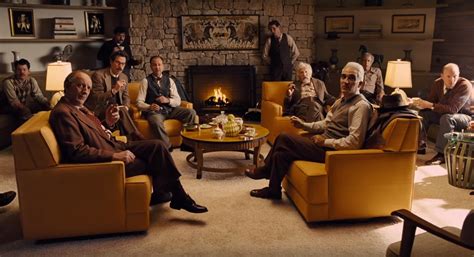
Nothing suspicious here, we’re just a dozen middle-aged men conspiring—TALKING!–in the middle of the day, in a house that’s not our own in the company of, uh, a world-renowned Marxist usurper. See? You’re being paranoid.
Baird had been kidnapped, held for ransom and in a tangle of commie justification, extorted to stay quiet because of a secret, a secret having to do with a film called On Wings As Eagles.
We have three images of the Christ. The Christian Christ, in Hobie Doyle, kindly, approachable and endearing, and the modern Jewish Christ in Burt Gurney, a political leader and usurper, willing to kidnap and extort to bring about heaven on Earth, his regime of Peace. Then there’s Eddie Mannix, it’s all well and good to appreciate the ultra-competent putter-out of fires, but Messiah? Maybe we shouldn’t thrust that burden on his already overloaded shoulders.
Jordan Petersen once asked a prominent Jewish philosopher why the Jews went crazy for communism, to which the man answered: it offered the chance for a worldwide government based on brotherhood. Sound familiar? Communism was a messianic movement, in the Jewish sense, but one that dispensed with the other troublesome components of a biblical messianic movement, you know, like adherence to the Ten Commandments.
This was expertly shown in a wordless scene wherein two of the communists, as they wait for Burt Gurney to arrive, solve a jigsaw puzzle. The puzzle is of a pillar of clouds—the same thing that guided the Jews through the desert—but as they reach the final piece, with only a single hole in the picture, they discover the remaining tile doesn’t fit. The Coen’s remarking about the religious replacement that was communism, but, after all was said and done, and a 100 million lay murdered in a ditch, it didn’t quite fit the picture on the box.
9. Hobie, the True Messiah?
Meanwhile, Hobie Doyle is on a sexless date with a Hispanic starlet not unlike Carmen Miranda that was arranged by the studio and thrown to gossip columnists by Eddie Mannix, basically to keep them off the trail of, say, a daylight kidnapping of a major Hollywood star. While sitting at his table he spies Burt Gurney finishing his meal. By Burt’s feet is none other than the valise he helped Eddie stuff with money, the one he hid behind the electrical box. Hobie excuses himself, ends his date, pursues Burt Gurney outside, commandeers his own chauffeured car and follows.
Hobie arrives at the Malibu mansion and when he enters finds he Baird Whitlock, still dressed as a Roman, sitting alone in the living room—no one else is there. Baird recognizes him, “Hobie Doyle?! Are you a communist too?” (this is possibly an allusion to communist sympathies held by some western movie stars and western singers, most notably Hank Williams, and, it’s rumored, Roy Rogers).
None of the communists were in the house, Baird informed Hobie they went down to the beach, what they actually did was load up on a large row boat with Burt Gurney and his lap dog. They rowed far out, with the briefcase of cash tucked by their ankles and Burt Gurney stood. Just then a pulsing red light rises from the water, followed by a rod that ascends up, up, up followed by strange beeping noise. From there the con-tower of a submarine breaks the surface of the water and the massive heft of the boat itself churns the sea and makes the row boat threaten to capsize, until it rests, it’s gargantuan bulk floating on the surface of the Pacific like an iron whale. The hatch at the top of the tower opens and stalwart Burt doesn’t flinch when a Russian naval officer pokes his head out.
At this point, Burt hands his dog to one of the cell members, “Take care of her,” like Jesus giving his mother to John, as in ‘Woman behold your son’ and in another miraculous event, leaps unnaturally onto the hull ladder attached to the sub. The communists tell Burt that the money should go to the cause, not the servants of the cause and they toss the valise to Burt, “They will be pleased,” he says. Just then his dog barks and runs to Burt, who, quite effetely yelps, “No, no no, stay, no!” but it leaps into his arms and the valise filled with money falls into the ocean and sinks down, down, down witnessed by the pained, grief-stricken faces of the communists.
Burt, seemingly without remorse, enters the sub and closes the hatch, the boat sinks, churning the sea again, threatening to capsize the row boat. The Coen’s point here—other than being a fun allusion to Jesus on the Sea of Galilee– is that whatever profit the communists thought would be gained, for themselves or the movement, would itself evaporate in the dissonance of their own false faith.
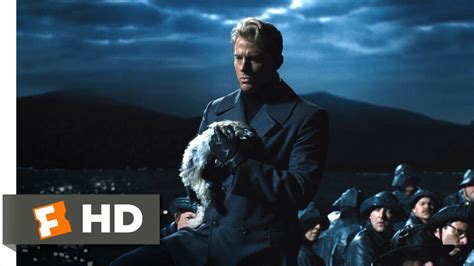
And my guidance counselor said all I’d be was a sad, gay drama coach desperately trying to hide the truth from that one aunt I still liked? Shows him. I don’t like any of my aunts.
Hobie Doyle sees none of this, but he tells Baird that Mr. Mannix is sick to death with worry and that he would take him home.
As they drive, sirens scream in the opposite direction, cops, or FBI, got wind of the cell, thanks to Hobie’s advice to ‘look at the extrees’. Baird is saved, the communists are arrested, one messiah flies away under the waves, another drives the pork-eating gentile to a hotel.
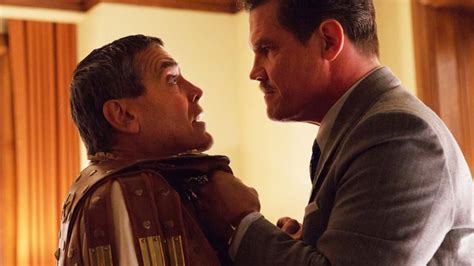
Beyonce is the greatest performer in world history! I’m sure that’s lost on you middle-aged white crackers cuz you still love that ‘rock’ shit, but let me tell you Beyonce will outlast Elvis or the Zepplins or that Oscar Ozborne–you mark my words, cracka! (Authors note: Actual comment reply on YouTube).
10. Eddie sets boundaries.
The next Morning, having arranged the bust of the communists, having protected Baird from the rumors that he and Lawrence Laurentz performed sodomy on the set of On Wings as Eagles, a rumor that convinced Eddie it was Burt Gurney at the center of it all as he and Lawrence Laurentz were, ahem, special friends.
Still dressed in his Roman costume, Baird gets debriefed by a stern and unamused Eddie Mannix, the guy won’t shut up about communism, he says the whole system is a sham designed steal his and everybody else’s labor, that’s it’s just a front to glean fat cats fat loads of cash without giving anybody anything in return, that no art was done, pictures aren’t art, there’s no spiritual element, they are product, product lots of people made but few profit from, and Nick Skenk, that fat cat in New York, is the chief exploiter of the body polit—
To which an enraged Eddie Mannix yanks him up and slaps him twice like a bitch in the barleycorn, “You Listen to Me! Nick Skenk and the studio have been good to you and everybody else that works here. If I ever hear you bad-mouthing Mr. Skenk again, it’ll be that last thing you say before I have you tossed in jail for colluding in your own abduction.”
“Eddie, I would never do that!”
Two more slaps. Bitch. And Barleycorn.
“You’re gonna go out there and finish Hail, Caesar! You’re gonna give that speech at the feet of the penitent thief and you’re gonna believe. Every. Word. You say.”
Two more: Backhand, front hand.
“You’re gonna do it because you’re an actor and that’s what you do. Just like the director does what he does and the writer and the script girl and the guy who claps the slate. You’re gonna do it because the picture has worth! And you have worth if you serve the picture and you’re never gonna forget that again.”
He shoves him back, Baird whimpers “I won’t forget, Eddie.”
“Damn right, you won’t. Not as long as I run this dump.”
Baird shuffles and turns for the door, whipped, but Eddie stops him, he can’t break company like that, “Baird,” he said. Baird turns, hang-dog, as Eddie sits and with just the glint of a smile, says “Go out there and be a star.”
And so, the story ends with the Roman giving a speech of salvation at the foot of the penitent thief. How many messiahs could we discern and why?
The Christian Messiah, Hobie Doyle, eventually saved the gentile, but he failed the messianic requirements because, though he was male, though he performed miracles, was universally adored, he did not establish a regime of peace, he was more of a helper in the thrust of time. The Christian messiah is a nice and kind man, charming and almost child-like in his lack of corruption. He was even pro-active, a clutch player. But the Messiah must rule and poor Hobie is a ward of the studio, goes where he’s told, dates who he’s told, makes movies written for David Niven because he’s told even though he looks ridiculous. So, the Christians have it wrong.
The Secular Messiah, as represented by the communists was male, performed miracles, was a political figure, he established a regime of something (peace? Maybe, to him) and being a movie star was universally adored, but he was not pious in as well as out, nor was he moral, being a homosexual represents a beach too far for the Messiah—strangely this is exactly what the Christian bible attributes to the anti-Christ, it says of him “He has no concern of women.” Most think that’s a prediction of his homosexuality. So, the communists/modern Jews have it wrong, too.
11. Eddie Mannix Was the Anointed One After All.
So, then we are presented with the True Christ. Eddie Mannix. Resolving a dozen impossible situations in one day was itself a miracle, keeping the studio on track with the absence of its star, finding that star, returning that star unrestrained by FBI for being in a communist cell, not to mention deflecting temptation from Lockheed, getting Scarlett Johannsen a husband, keeping the papers and their dueling twin sisters from splattering gossip all over the page and finagling a minor misunderstanding about which position his son will play on the baseball team, all while making it home so his wife can reheat dinner, I don’t know what kind of miracle that is, but it is one, and he does it every day.
Not to mention he establishes a regime of peace, and he is universally adored, not for being on a screen, but for his action in real life, not his image, his ‘praxis’. But add he’s also universally feared, while being universally trusted, a key point, any real Messiah, tasked with that slate would have to be all of those. He shows, via Baird’s blasphemy about Mr. Skenk, that he is pious in and out, and when he tells Baird to believe every word of the speech at the feet of the penitent thief, a speech entirely about faith, and Baird actually does, we see that not by politics, and not by miracles, is the Messiah to align Man with God, but he will inspire faith by virtue of his own.
The true messiah will keep the blasphemous impulses of the swine-eating gentile to a manageable degree but he will also encourage the uncircumcised, sexually-promiscuous drunk, because after all, he’s the prize, The prize for Mr. Skenk and the studio. He’s a star, and dammit he’ll act like it.
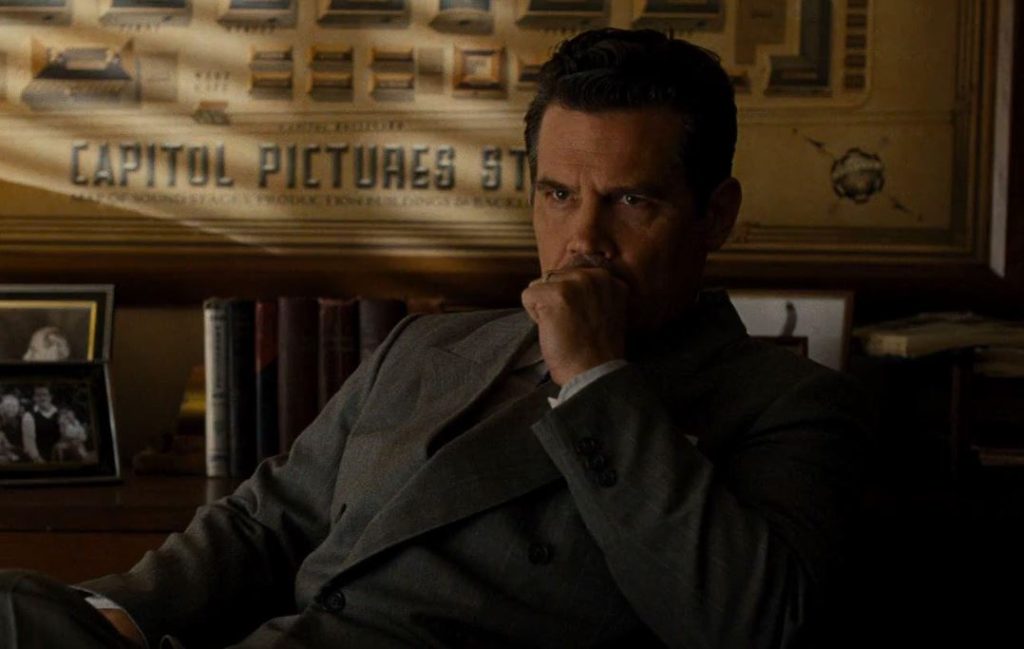
Right. Of Course. Seems logical. What troubles me is what happens after I alienate my whole family for roping them into a pyramid scam, does Amway have a soap or shampoo for that?
The film was, at times, messy, it was not A Serious Man, because the Old Testament is not the New Testament. The New Testament is more a philosophical extrapolation of the old, and the movie tries with Scarlett Johannsen as The Virgin Mary, Jonah Hill as Joseph, the Lockheed man trying desperately to tempt Eddie Mannix to leave the studio –you know, Satan—with winks to Armageddon and the telephone call to Mr. Skenk every morning an excellent representation of prayer, to anthologize the New Testament, but it could not accomplish this as well with the New as with the Old— such is art, but given the goals they had in mind I can’t figure a better scheme for its attempt.
I would’ve liked to see water turned to wine, the feeding of five thousand (bread and fishes), demons cast into pigs, perhaps, and a stronger crucifixion narrative would have been well received, or an allusion to Pilate “Behold the man!” But they fit in with what they could figure out and given the myriad ways it could go-Judas on us, the fact that it didn’t mean the Coens served up a pretty damn good film on a silver platter.
Of course, seeing Hobie Doyle over-turn a metaphorical money-lender’s table would have been epic, “You thought you could turn Mr. Skenk’s studio into a den of commies?! Would that it twere so simple!”
Leave a Reply